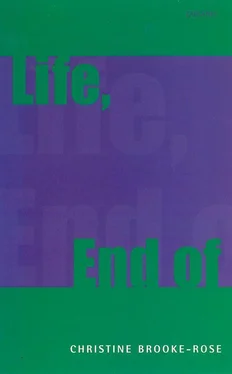Christine Brooke-Rose - Life, End of
Здесь есть возможность читать онлайн «Christine Brooke-Rose - Life, End of» весь текст электронной книги совершенно бесплатно (целиком полную версию без сокращений). В некоторых случаях можно слушать аудио, скачать через торрент в формате fb2 и присутствует краткое содержание. Год выпуска: 2012, ISBN: 2012, Издательство: Carcanet Press Ltd., Жанр: Современная проза, на английском языке. Описание произведения, (предисловие) а так же отзывы посетителей доступны на портале библиотеки ЛибКат.
- Название:Life, End of
- Автор:
- Издательство:Carcanet Press Ltd.
- Жанр:
- Год:2012
- ISBN:9781847775726
- Рейтинг книги:5 / 5. Голосов: 1
-
Избранное:Добавить в избранное
- Отзывы:
-
Ваша оценка:
- 100
- 1
- 2
- 3
- 4
- 5
Life, End of: краткое содержание, описание и аннотация
Предлагаем к чтению аннотацию, описание, краткое содержание или предисловие (зависит от того, что написал сам автор книги «Life, End of»). Если вы не нашли необходимую информацию о книге — напишите в комментариях, мы постараемся отыскать её.
by a master of experimental novels finds the author reflecting on her old age and its effects on her writing. As she reflects on her own career, her experiments with narrative, and on the narrative she writes here, she ultimately reasserts herself and accepts the life behind her.
Life, End of — читать онлайн бесплатно полную книгу (весь текст) целиком
Ниже представлен текст книги, разбитый по страницам. Система сохранения места последней прочитанной страницы, позволяет с удобством читать онлайн бесплатно книгу «Life, End of», без необходимости каждый раз заново искать на чём Вы остановились. Поставьте закладку, и сможете в любой момент перейти на страницу, на которой закончили чтение.
Интервал:
Закладка:
This morning, wow, the short trip from the bathroom to the living-room is quite unconsciously achieved without the zimmer, this new companion, and done half awake but thinking of something else. On arrival at the living-room, help, how to go back? Well, the return is the same. It’s true that the two doors and short corridor walls are close for hand support. Still, this tiny trip alone and unaware shows that some of the fear and possibly therefore the imbalance is psychological. All to do with messages from the brain, echoing the physio. Soon it may come to sleep-walking.
To and fro. Like a furrow. Someone says — yes, well, one of the privileges of old age and writing for the self is that all thoughts gallivanting or limping through the brain are mostly hearsay and seesay, without the need for acknowledgements or scholarly refs; all ‘someone says’ means is that it doesn’t come from the inner ear or the pineal gland but from the outer ear. Someone is not O.P. but o.p. So: someone says that writing a line of verse is like a plough cutting a furrow to the end, turning and coming back, the turn of the plough being the end-rhyme or the enjambement. Nice, though in fact neither verse nor prose comes back facing the other way, elbadaernu eb dluow hcihw. Even Hebrew and Arabic, reading right to left, can’t come back left to right. No vice versa there either.
§ § § § § § § § § § § § § § § § § § § § §
§
& & & & & & & & & & & & & & & & & & & & &
&
@ @ @ @ @ @ @ @ @ @ @ @ @ @ @ @ @ @ @ @
@
# # # # # # # # # # # # # # # # # # # # # #
#
* * * * * * * * * * * * * * * * * * * * *
The flowers of the Morning Glory are truly blue when in the shade, mauve in the sun. Or perhaps that’s a coincidence, concealing the fact that they’re bluely true when in full bloom but mauve as they start fading and pink when dying. Rather like blue blood.
But today Luc the gardener comes with his brother, for the autumn cleaning. It’s interesting that they have closed their big nursery garden where customers waste the elder brother’s time being shown round, advised, helped, paying, asking for their choices to be trolleyed to their car. Luc, the itinerant gardener, cleans up the gardens of foreigners and Parisians who can’t be bothered. Or who no longer can. Together they now do only this, and now come alone, without Mohammed — Mo-mo — and the other worker. That’s a bit like big buyers of firms at once reducing the work force. But they bought themselves up, in a way, defending their trade in an inefficient system which makes workers and all the admin they entail too expensive, a losing deal. Luc talks of all this among other things in a long chat at paytime, keeping his brother waiting down the stone stairs.
The garden, or citadel patio, is now all cleaned up, crisped up, like Mozart’s periwig. The bignonia with its orange trumpets, that grows over the whole front of the house, unseen from the bed for seven weeks tomorrow, is cut down to the bare branch level. And of course, so is the Morning Glory, watched from the same bed as it spreads over every other plant during the late Indian summer. Perhaps it revels in heat-waves. No other flower seems to do so. Is this visual relationship personal, now that they’re wholly visible at last? The geraniums are hardly breathing. This from the terrace with the zimmer, for the first time, on naked feet not feeling the tiles. What can now be seen is that the original mother-stalk of the Morning Glory nearest to the bedroom is kept, together with the slanting spread away from the house, though this is now cut well below the top row of deities, to liberate the stifled roses and everything else below. The blue flowers look many and blue as blue. What must now be the view from the bed? Later, later. The devilish mouths and wolfish howls and goose quacks are presumably still there, but with most of the stone ghosts revealed once more and Artemis no longer wrapped in scarf like a Muslim girl. Or Poseidon. Much the same, really, what with algues for hair instead of veil.
Will all these hallucinations slowly disappear? Now that the body is a bit more mobile, and dressed, and pseudo-normal. Or will they increase, independently of all that? Whatever the answer, you must draw the consequences. What, without a pencil? is the questioning reply. Where from? Tableaux vivants, natures mortes (as someone says).
Perhaps, as with Muslims, a guardian angel sits on every shoulder to intercept messages. These are corrupt at times from bad reception. But he doesn’t need to decode them.
The hands, the legs, the shoulders, the body. Super-valued by early man in eras long gone by. Yet evolution stops for all those bits and pieces, continuing only behind the control-board.
But whereas in a car or plane all the wheels and other equivalents of feet or hands have to be in perfect condition for the control to work, in humans they can languish cramp clamour drill and frazzle while the brain continues to pretend and think of quite other things. At least for a while. Perhaps that’s why it’s so often behind, without knowing it. Behind what? Other People? Aren’t we all both behind and ahead?
There’s such an odd mix of advance and archaism everywhere, such as dead ritual in England, europomp and circumstance in both retarded Africa and advanced China, ecological disaster in modern Russia, scientific backwardness in many other modern countries, puritanism in America with its accompanying self-righteousness, in France brain drains versus high-speed trains. There isn’t one serious radio or TV discussion on any topic whatsoever, political, social, technological, philosophical, in which sooner or later someone doesn’t admit, quite naturally, ah oui, nous avons pris un certain retard dans ce domaine.
And on a special programme for Handicap Year on radio this morning, a handicapped man says the TGV is thirty years late on accessibility. He’s in a wheelchair, so must be himself severely handicapped, yet talks entirely about access, to cars, to buses, to trains, to planes, how slow the improvements, how archaic the people running these ways and means, who say in effect, and sometimes in fact, ‘We’re helping you because you’re incapable of walking’, rather than ‘We’re helping you because the railway company is incapable of doing what you need.’
That man in a wheelchair is presumably more handicapped than a provisional (temporary?) zimmer person. Yet he travels, by train, plane, car, comes to the radio, parks, and goes to meetings on the problem. Apart from the sprain the zimmer person is more lightly but just as permanently handicapped, by Polly, can’t even leave the two-roomed flat which her house has become, or go downstairs any more to step into a low car, let alone get out of it, or see if there’s any mail. The last invitation to dinner: Jean-Yves and Paquita and Rosetta of the globo. Months ago it seems. Inconceivable now. That’s the speed of it all.
Ah, accessibility. Now replacing the old equality. Schoolchildren pester their mothers for mauve trainers because all the others have them. To be like the others. Yet different. Just like the feminists. Like fashion-setters. Like countries at war. In competition. The key is access. In education, in health, in wealth, in society, in the Other Paradise, the lot.
Still, the ways and means are surprising here and sometimes there. Ads appear in France in the 90s that would be disallowed or even never thought up aleady thirty years ago in Britain or America, some still occasionally seen today. Two chimps clothed as humans and busy with a washing-machine and a washing powder, very happy, but over-voiced and captioned in Creole; girls in a jungle, waiting for rain so that they can all wash their hair together in a specific shampoo, poisoning the earth; a man rubbing his hair in a famous lotion then throwing the towel down for someone to pick up; a man saying ‘J’adore les femmes… elles aiment tout ce qui brille…’ which turns out to be floor-polish.
Читать дальшеИнтервал:
Закладка:
Похожие книги на «Life, End of»
Представляем Вашему вниманию похожие книги на «Life, End of» списком для выбора. Мы отобрали схожую по названию и смыслу литературу в надежде предоставить читателям больше вариантов отыскать новые, интересные, ещё непрочитанные произведения.
Обсуждение, отзывы о книге «Life, End of» и просто собственные мнения читателей. Оставьте ваши комментарии, напишите, что Вы думаете о произведении, его смысле или главных героях. Укажите что конкретно понравилось, а что нет, и почему Вы так считаете.












